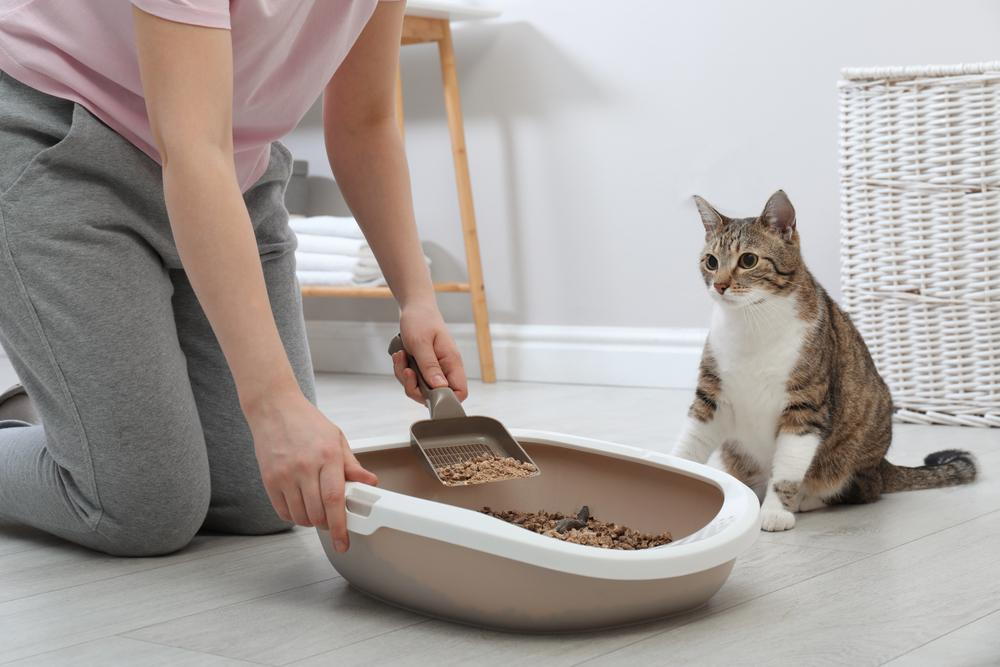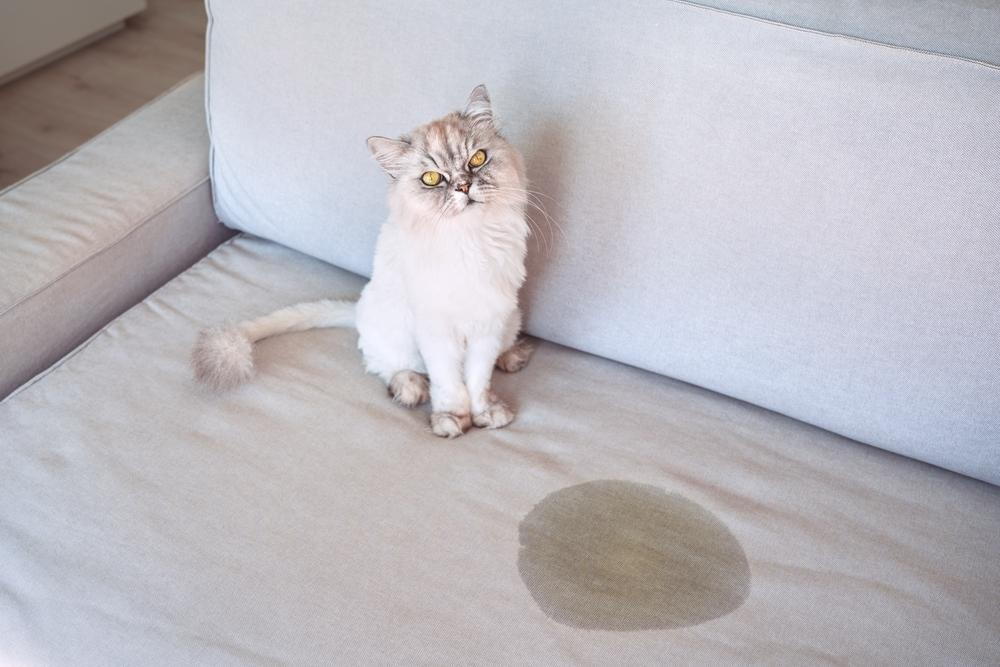If your cat has been urinating outside their litter box, you likely feel perplexed and frustrated. But before resorting to scolding or punishment, remember that this behavior often signifies an underlying medical or behavioral issue. Our Sarasota Animal Medical Center team understands the worry and inconvenience your whiskered pal’s inappropriate elimination can cause, and we provide this guide to the possible causes and solutions.
Rule out common medical conditions in your cat
Urinating outside the litter box should never be ignored. Schedule an appointment with our team as soon as possible to rule out any medical conditions that might be causing your cat discomfort or pain during urination, including:
- Urinary tract infections (UTIs): — UTIs cause frequent urination, urgency, and discomfort. Antibiotics usually resolve the issue quickly.
- Bladder stones — These painful mineral deposits can obstruct urine flow, leading to inappropriate urination. Many treatment options are available, from dietary changes to surgical removal, depending on the stone type and blockage severity.
- Urinary crystals — Tiny mineral crystals can form in your cat’s urine and irritate the bladder lining, causing pain and frequent urination. Depending on the urinary crystal type, a cat requires specific dietary modifications or medications for dissolution and prevention. If left untreated, these crystals can cause total urethral obstruction, which requires emergency intervention and could be fatal.
- Diabetes mellitus — This hormonal imbalance increases thirst and urine production, prompting cats to seek alternative elimination spots. Medication and dietary changes are necessary for managing diabetes and the condition’s complications.
- Kidney disease — Advanced kidney disease can affect a cat’s kidney function, leading to increased urination and litter box habit changes.
If your whiskered pal is inappropriately eliminating, our team will conduct a thorough physical examination, run diagnostic tests, such as urine tests, blood work, and possibly imaging, such as X-rays or ultrasound. We will also want to know about your cat’s medical history to reach a diagnosis and recommend an appropriate treatment plan.
Addressing behavioral causes for your cat’s inappropriate elimination
If our team rules out medical causes for your cat’s inappropriate elimination, the source of the problem might be behavioral. Cats are creatures of habit; even subtle changes in their environment or routine can cause litter box avoidance. Here are some common behavioral triggers to consider:
- Box cleanliness – Cats are fastidious creatures and prefer a spotless litter box. Scoop waste daily and completely change the litter regularly, typically once per week.
- Litter type — Experiment with different unscented clumping litter options to find your cat’s preference. Avoid strong fragrances, as they can be overwhelming to sensitive feline noses.
- Number of boxes — Competition for resources, such as the litter box, can be stressful for a cat. A good rule of thumb is to have one box per cat plus one extra. This ensures that each household cat has options, which helps reduce competition in multi-cat households.
- Box size and accessibility — Choose boxes large enough for your cat to comfortably turn around and dig. Ensure each litter box is easily accessible, not blocked by furniture, and placed in quiet, low-traffic areas. In addition, place a litter box on each home level.
- New additions or changes — Introducing a new pet, moving furniture, or even bringing home unfamiliar scents on your shoes or clothing can threaten your cat’s security.
- Stress and anxiety — Loud noises, unfamiliar visitors, or fear of other pets can lead to inappropriate urination. Identify and address stress factors, create a calm environment, and consider using pheromone diffusers for anxiety relief.
Strategies for behavioral modification in pets

If our team determines a medical issue is causing your whiskered pal to avoid their litter box, we will provide effective treatment. However, if we suspect your cat is eliminating inappropriately because of stress, we will recommend behavioral modifications to pinpoint the cause. To help encourage your cat to use the litter box again, follow these tips:
- Enhance the litter box experience — Choose unscented clumping litter, scoop daily, and provide multiple boxes in quiet locations. Experiment with various litter types and box sizes to find your cat’s preference.
- Positive reinforcement — When your cat uses the litter box appropriately, provide them with praise and rewards such as treats or petting. This creates a positive association with the litter box experience.
- Address stress factors — If stress is causing your cat’s inappropriate elimination, work to identify and minimize their stressors. Provide hiding spots, vertical spaces, and playtime to enrich your cat’s environment. Consider using Feliway pheromone diffusers or calming herbal supplements. Consult with our team before introducing herbal supplements to your cat’s diet.
- Gradual litter changes — If switching litter types, gradually mix the new litter with the current litter over several days. This allows your cat to adjust to the new texture and scent.
Changing inappropriate elimination behavior takes time and patience. Consistency with cleaning, litter box management, and addressing the underlying cause is essential. Don’t be discouraged if setbacks occur; these are normal. If you’re struggling to pinpoint the cause of your whiskered pal’s inappropriate behavior, reach out to our team for additional guidance, behavior modification strategies, and medication options.
Remember, your whiskered pal is not peeing outside their litter box just to make you angry. They likely have an underlying medical issue or anxiety. Schedule an appointment with Sarasota Animal Medical Center to ensure your cat is healthy and stress-free.

